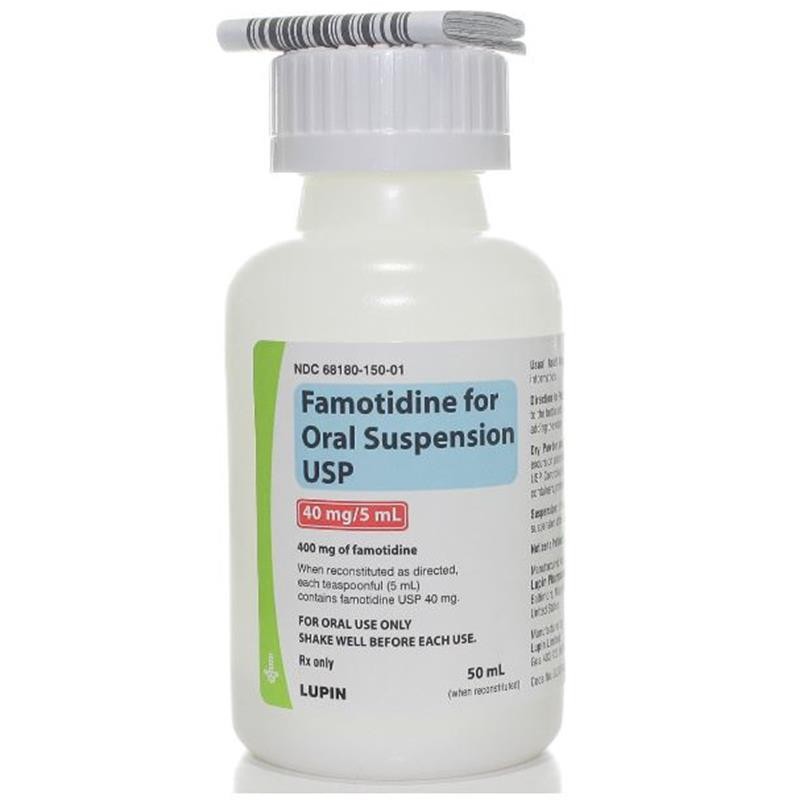
Famotidine Suspension – Oral, Pepcid
Medication Uses How To Use Side Effects Precautions Drug Interactions Overdose Notes Missed Dose Storage USES: Famotidine is used to treat ulcers of the stomach and intestines. It may be used to prevent intestinal ulcers from returning after treatment. This medication is also used to treat stomach and throat problems caused by stomach acid (e.g., Zollinger-Ellison syndrome, erosive esophagitis) or a backward flow of stomach acid into the esophagus (gastroesophageal reflux disease-GERD). Famotidine is known as an H2 histamine blocker. It works by reducing the amount of acid in your stomach. This helps heal ulcers and improves symptoms such as heartburn and stomach pain. HOW TO USE: Shake the bottle well for 5-10 seconds before each dose. Measure the dose carefully using a special measuring device/spoon. Do not use a household spoon because you may not get the correct dose. Take this medication by mouth with or without food as directed by your doctor. The dosage and length of treatment are based on your medical condition and response to therapy. In children, dosage may also be based on body weight. Follow your doctor’s instructions carefully. You may take other medications (e.g., antacids) for your condition as recommended by your doctor. Take this medication regularly to get the most benefit from it. To help you remember, take it at the same time(s) each day. Do not increase your dose or take it more often than prescribed. Do not stop taking this medication without your doctor’s approval because this may delay healing of the ulcer. Inform your doctor if your condition does not improve or worsens. SIDE EFFECTS: Headache, dizziness, constipation or diarrhea may occur. If any of these effects persist or worsen, notify your doctor or pharmacist. Remember that your doctor has prescribed this medication because it benefits you more than the risk of side effects. Many people using this medication do not have serious side effects. Tell your doctor immediately if any of these rare but very serious side effects occur: easy bleeding/bruising, fast/slow/irregular heartbeat, signs of infection (e.g., fever, persistent sore throat, cough), mental/mood changes (e.g., agitation, confusion, depression, hallucinations), seizure. A very serious allergic reaction to this drug is unlikely, but seek immediate medical attention if it occurs. Symptoms of a serious allergic reaction include rash, itching/swelling (especially of the face/tongue/throat), severe dizziness, trouble breathing. This is not a complete list of possible side effects. If you notice other effects not listed above, contact your doctor or pharmacist.
PRECAUTIONS: Before taking famotidine, tell your doctor or pharmacist if you are allergic to it; or to other H2 receptor antagonists (e.g., cimetidine, ranitidine); or if you have any other allergies. This product may contain inactive ingredients, which can cause allergic reactions or other problems. Talk to your pharmacist for more details. Before using this medication, tell your doctor or pharmacist your medical history, especially immune system problems, kidney problems, liver problems, lung diseases (e.g., asthma, chronic obstructive pulmonary disease-COPD), other stomach problems (e.g., tumors). Some symptoms may actually be signs of a more serious condition. Get medical help right away if you have: heartburn with lightheadedness/sweating/dizziness, chest/jaw/arm/shoulder pain (especially with shortness of breath, unusual sweating), unexplained weight loss. This drug may make you dizzy. Do not drive or do any activity that requires alertness until you are sure you can perform such activities safely. Limit alcoholic beverages. Older adults may be more sensitive to the side effects of this drug, especially confusion. Famotidine should be used only when clearly needed during pregnancy. Discuss the risks and benefits with your doctor. This drug passes into breast milk. Consult your doctor before breastfeeding. DRUG INTERACTIONS: Drug interactions may change how your medications work or increase your risk for serious side effects. This document does not contain all possible drug interactions. Keep a list of all the products you use (including prescription/nonprescription drugs and herbal products) and share it with your doctor and pharmacist. Do not start, stop, or change the dosage of any medicines without your doctor’s approval. Since famotidine reduces the amount of acid in your stomach, it may also change the absorption of certain medications and affect how they work. Some examples of affected drugs include atazanavir, dasatinib, delavirdine, certain azole antifungals (such as itraconazole, ketoconazole). Ask your doctor or pharmacist if any of the medications you take are affected by famotidine and how to manage this interaction. Check the labels on all your medicines because they may contain aspirin or aspirin-like NSAIDs (e.g., ibuprofen, naproxen) that can cause stomach irritation/ulcers. Ask your pharmacist about the safe use of those products. Low-dose aspirin, as prescribed by your doctor for specific medical reasons such as heart attack or stroke prevention, should be continued. Consult your doctor or pharmacist for more details. This medication and similar H2 blockers (e.g., cimetidine, ranitidine) are available both over-the-counter and by prescription. Do not take them at the same time. OVERDOSE: If overdose is suspected, contact a poison control center or emergency room immediately. US residents can call their local poison control center. Canada residents can call a provincial poison control center.
QUESTION
NOTES: Do not share this medication with others. Lifestyle changes such as stress reduction programs, stopping smoking, limiting alcohol, and diet changes (e.g., avoiding caffeine, certain spices) may increase the effectiveness of this medication. Talk to your doctor or pharmacist about lifestyle changes that might benefit you. Laboratory and/or medical tests (e.g., endoscopy, kidney function tests) may be performed to monitor your progress or check for side effects. Consult your doctor for more details. MISSED DOSE: If you miss a dose, take it as soon as you remember. If it is near the time of the next dose, skip the missed dose and resume your usual dosing schedule. Do not double the dose. STORAGE: Store at room temperature at 77 degrees F (25 degrees C) away from light and moisture. Brief storage between 59-86 degrees F (15-30 degrees C) is permitted. Discard any unused medication after 30 days. Do not store in the bathroom. Keep all medicines away from children and pets. Do not flush medications down the toilet or pour them into a drain unless instructed to do so. Properly discard this product when it is expired or no longer needed. Consult your pharmacist or local waste disposal company for more details on how to safely discard your product. Information last revised February 2014. Copyright(c) 2014 First Databank, Inc.
Report Problems to the Food and Drug Administration
You are encouraged to report negative side effects of prescription drugs to the FDA. Visit the FDA MedWatch website or call 1-800-FDA-1088.
Selected from data included with permission and copyrighted by First Databank, Inc. This copyrighted material has been downloaded from a licensed data provider and is not for distribution, except as may be authorized by the applicable terms of use.
CONDITIONS OF USE: The information in this database is intended to supplement the expertise and judgment of healthcare professionals. The information is not intended to cover all possible uses, directions, precautions, drug interactions or adverse effects, nor should it be construed to indicate that use of particular drug is safe, appropriate or effective for you or anyone else. A healthcare professional should be consulted before taking any drug, changing any diet or commencing or discontinuing any course of treatment.
CONDITIONS OF USE: The information in this database is intended to supplement the expertise and judgment of healthcare professionals. The information is not intended to cover all possible uses, directions, precautions, drug interactions or adverse effects, nor should it be construed to indicate that use of particular drug is safe, appropriate or effective for you or anyone else. A healthcare professional should be consulted before taking any drug, changing any diet or commencing or discontinuing any course of treatment.


